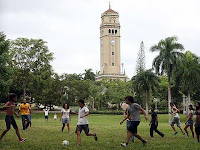 The island's most important institute of higher education, the University of Puerto Rico (UPR), has been shut down by students since last Wednesday. Unfortunately, the strike has taken an ugly turn as numerous confrontations between students and
The island's most important institute of higher education, the University of Puerto Rico (UPR), has been shut down by students since last Wednesday. Unfortunately, the strike has taken an ugly turn as numerous confrontations between students and According to members of the Action Committee of Students of Law (Comité de Acción de Estudiantes de Derecho) at UPR-Rio Piedras, students want to prevent the destruction of the island's most important center of learning. Moreover, they also want to guarantee the right for all to a public education. Nevertheless, this group does not represent the sentiment of the entire student population. An important note to consider is the number of those who approved this strike. At the UPR-Rio Piedras campus, with approximately 19,000 students, 763 students voted in favor and 261 voted against the shut-down. This is to say 4% of the entire student body officially support the strike.
The increasing cost of a public college education is not an isolated trend pertaining only to the island of Puerto Rico. On the mainland U.S, the average tuition increase at a 4-yr. public college rose 6.5% in 2009 compared to the 2008 academic year. This is no surprise as many states have had to adopt more austere budget packages. In addition to local funding from the Puerto Rican government, UPR does also receive funding from the U.S federal government in the form of grants for scientific research, amongst others. Students are also eligible for certain types of federal financial aid programs. Currently, talks between the university President and student leaders have stalled. Both sides have yet to agree on the rules for mediation.
Update (5/20/10): Clashes between students (and parents) and police officers have grown more violent and intense as the strike continues. Unfortunately, there hasn't been much progress made in the negotiation between student leaders and the university's administration. Here's a link to the coverage of the strike from Democracy Now.
Image above obtained from El Nuevo Día, www.endi.com



2 comments:
First off, I'd like to say that I enjoy reading your blog and the perspective you bring. I often have this debate with my cousin regarding the strikes which seem to be quite regular. To me, it's a simple question of economics. Students at UPR pay an extraordinarily low tuition in comparison to really any other place that does not provide state funded higher education. Add to this a budget crisis rivaled only by the great depression and you have a situation that in reality leaves one to believe that those who voted for the strike are most certainly not from the finance program.
In a time when it is routine for a mainland state school student to come out of school with 30k in student loans, I feel that this is a fight that demonstrates an insular attitude and fundamental lack of understanding of the situation in the outside world. The reality that 700 students can shut down a system and disrupt the education of tens of thousands is sad. However, the fact that only 200 students voted against is perhaps sadder.
Hello Anonymous,
Thanks so much for your comments. While I understand the UPR students' concerns, I don't think they're being realistic. Puerto Rico has been in a recession for four years going on five. The government is in no position to provide a free public college education for everyone. The only people who are losing out on this strike are the students themselves. Something has got to give.
Post a Comment